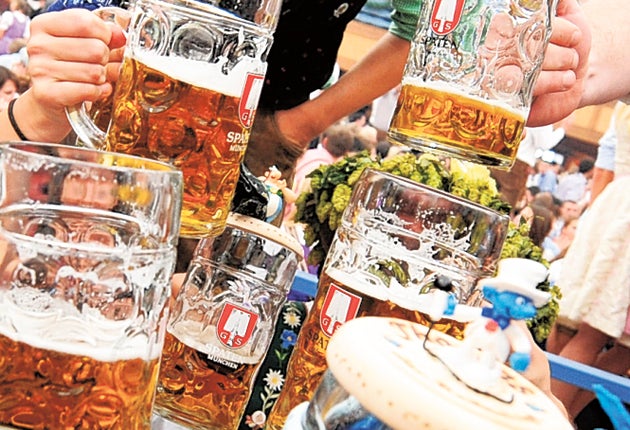Oktoberfest turns to microbe to hide stink of stale beer

Your support helps us to tell the story
From reproductive rights to climate change to Big Tech, The Independent is on the ground when the story is developing. Whether it's investigating the financials of Elon Musk's pro-Trump PAC or producing our latest documentary, 'The A Word', which shines a light on the American women fighting for reproductive rights, we know how important it is to parse out the facts from the messaging.
At such a critical moment in US history, we need reporters on the ground. Your donation allows us to keep sending journalists to speak to both sides of the story.
The Independent is trusted by Americans across the entire political spectrum. And unlike many other quality news outlets, we choose not to lock Americans out of our reporting and analysis with paywalls. We believe quality journalism should be available to everyone, paid for by those who can afford it.
Your support makes all the difference.The Munich Oktoberfest may be the world's most famous beer festival, but for the first time in its 200-year history, the organisers are planning to use bacteria to eliminate its more pungent odours.
The organisers claim that a smoking ban, which will come in to force at the festival this year, will remove the usual stench of cigarette smoke which previously hid the unpleasant smell of stale beer.
The extraordinary measures are to be enforced in the Oktoberfest's renowned Hofbräu beer tent and at least two other tents when the festival opens this weekend. The aim is to kill off the smell left by the gallons of beer routinely spilled on to the wooden floors of the tents, leaving a stale odour behind.
The Oktoberfest's organisers have dismissed charges that they have become fastidious or absurdly politically correct.
Ricky Steinberg, the manager of the Oktoberfest's Hofbräu tent, says the experience of Munich pub and club owners following the introduction of a state-wide smoking ban last month shows the threat posed by the odour of stale beer should not be underestimated.
"The night club owners say the smell has become very bad since the smoking ban was enforced," he told the city's Merkur newspaper.
From this Saturday, when the Oktoberfest opens for three weeks and marks its 200th anniversary, a special odour killing bacteria called Elbomex will be poured on to the floorboards of the Hofbräu and other festival tents. It will be the first Blitzkrieg against stale beer odour in German history. Elbomex, which is sometimes used to rejuvenate garden soil, is produced by a Bavarian company which sells commercial dishwashers. However the company insists that the bacteria are also useful in eliminating smells caused by cesspits and compost heaps and will be effective in combating stale beer smells.
The Hofbräu brewery hopes that the bacteria will provide a fresher atmosphere in which festival goers will feel encouraged to drink the Oktoberfest's traditional one litre measures of beer and eat the spit roasted chickens, grilled pigs' trotters and roast ox which are favourite food offerings at the event.
Having started out as a cattle market for farmers, the official Oktoberfest was first held in 1810 to celebrate the marriage of the Bavarian Crown Prince Ludwig to Princess Therese of Saxony-Hildburghausen.
Once dismissed as a drinking factory for thigh-slapping Bavarians in leather shorts, it has now become one of Germany's most fashionable events, attracting unprecedented crowds of twentysomething visitors who delight in dressing up in traditional Bavarian costumes. "The Oktoberfest has discarded its old fashioned image and is chic again, especially for the young," wrote Der Spiegel magazine
The fact that 60 per cent of Oktoberfest visitors are largely non-smoking under-30-year-olds may account for the brewers' fears of an increased aversion among festival goers to the smell of stale beer.
At last year's Oktoberfest, beer consumption rose to 6.5 million litres. This year Munich's brewers are expecting to easily top that figure. To mark the festival's 200th anniversary, they have temporarily suspended the fierce competition that exists between them and joined forces to produce a special jubilee beer for the occasion.
The brewers claim the amber coloured ale, brewed to a secret recipe, is an improved version of the beer that was drunk at the festival 200 years ago. "It is full-bodied in taste with a flowery malt aroma," they announced in a joint statement.
At 6 per cent alcohol, it will also be considerably stronger than the average Bavarian beer and capable, no doubt, of making drinkers temporarily oblivious to any wayward whiff of stale ale.
Join our commenting forum
Join thought-provoking conversations, follow other Independent readers and see their replies
Comments